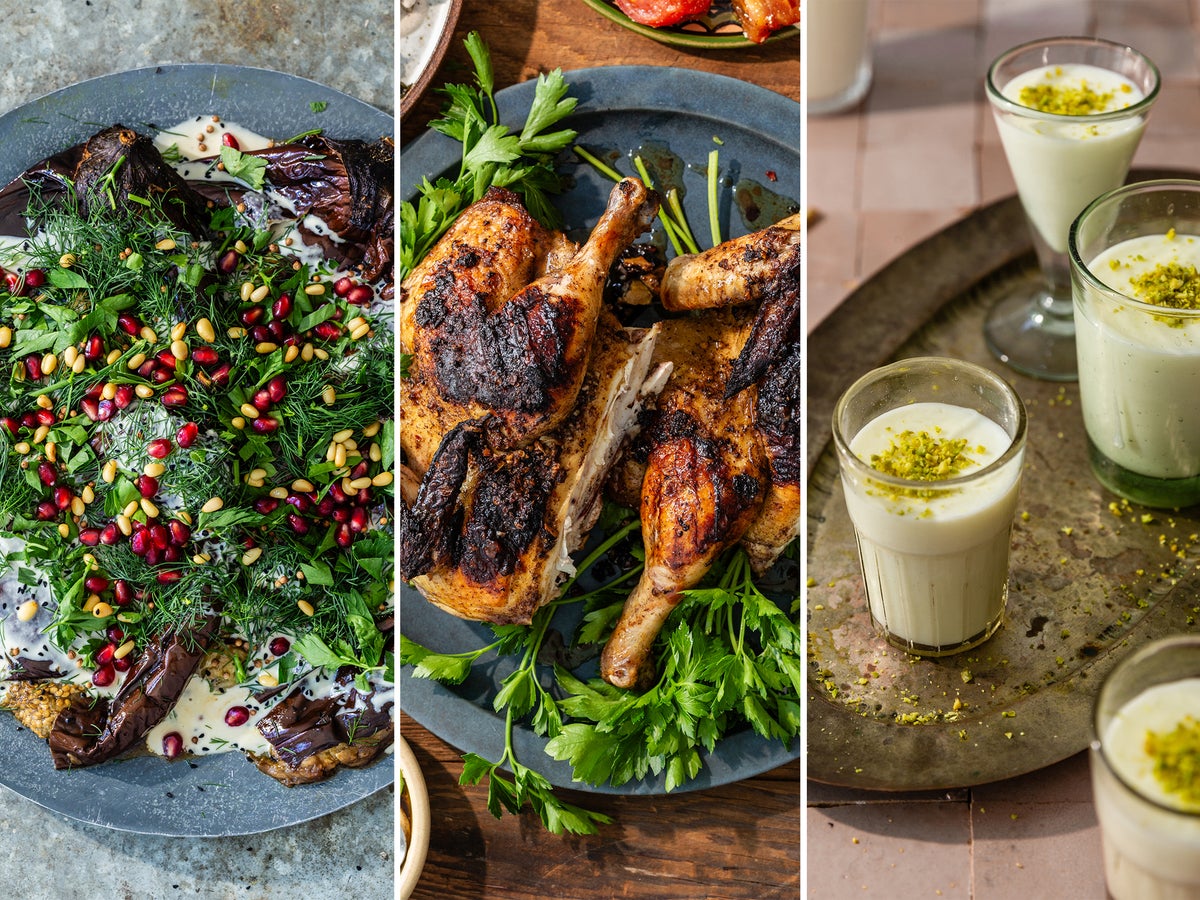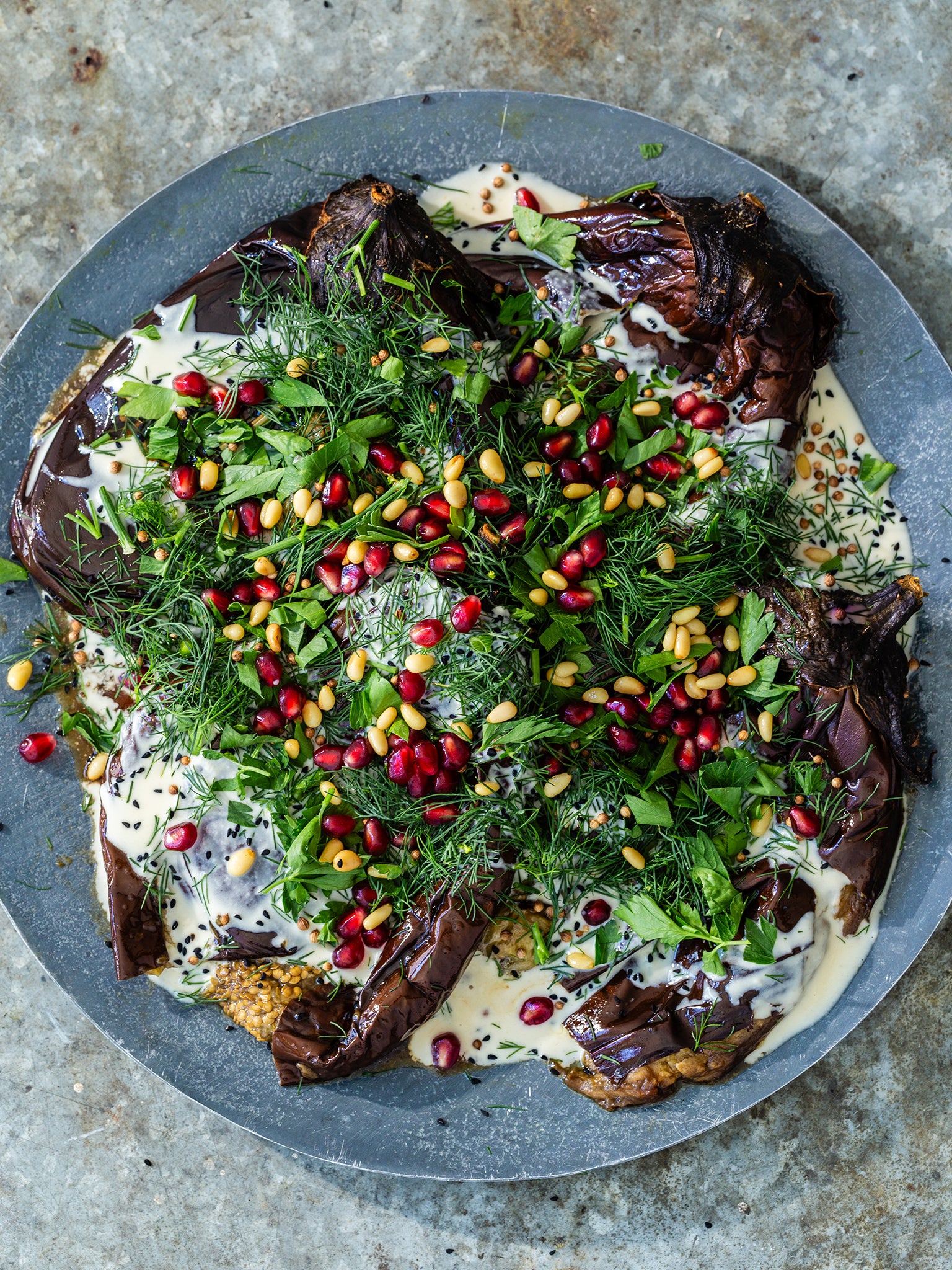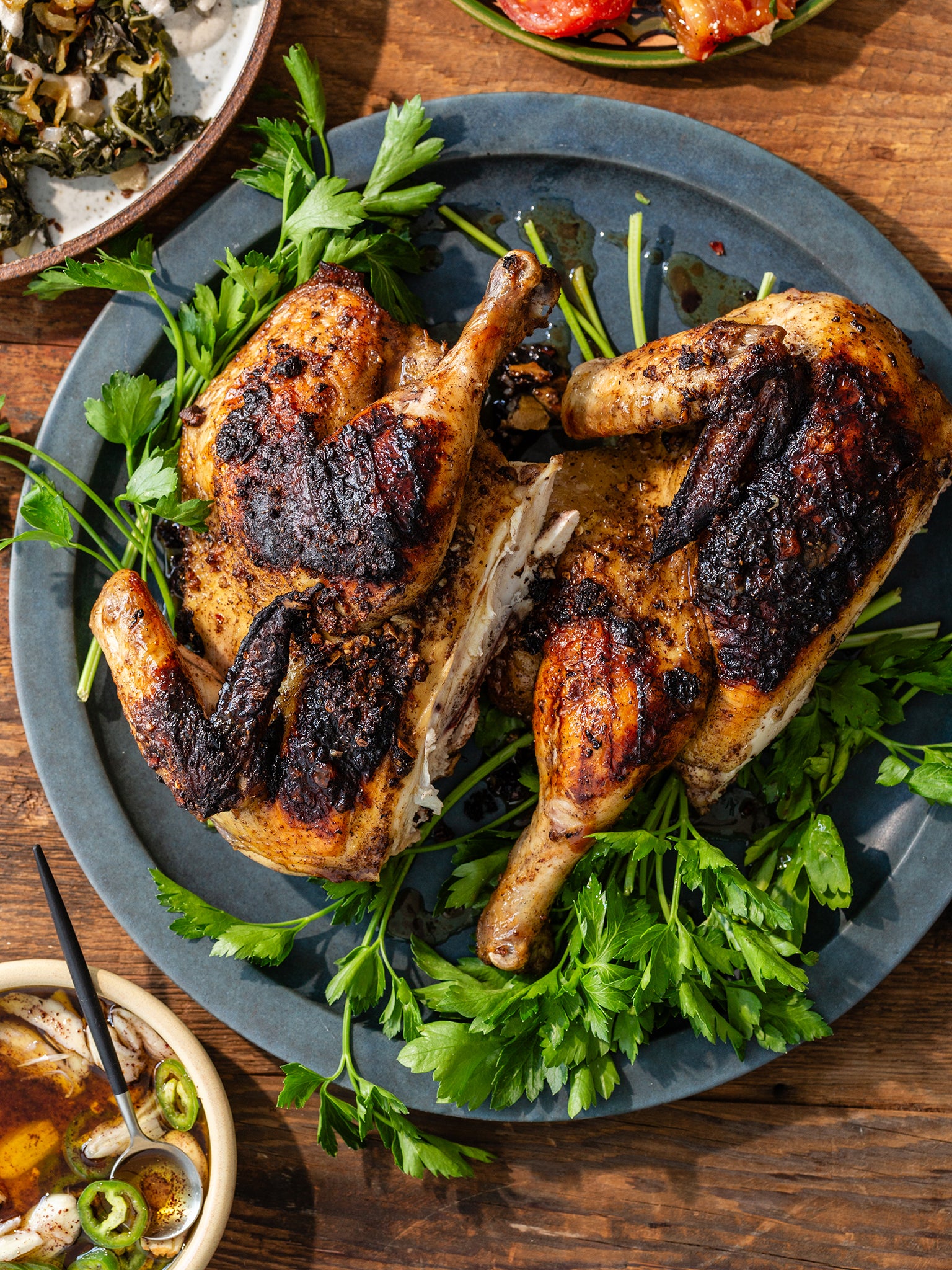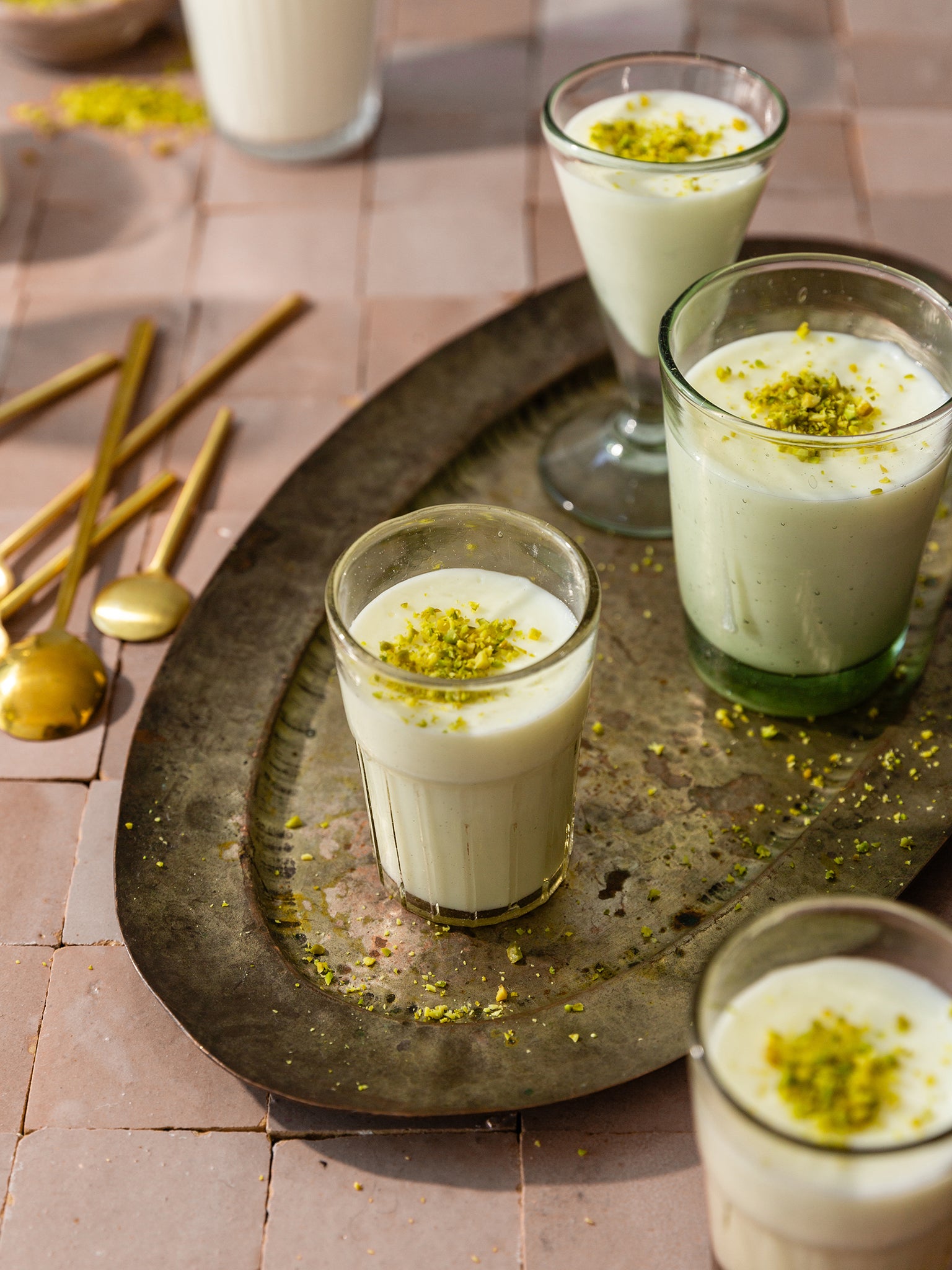
“We use aubergine in all manner of recipes,” says Franco-Palestinian chef Fadi Kattan.
“It is a wonderful vegetable when it’s roasted, charred, and smoky, and we all know how fantastic baba ghanouj is. This recipe works as a starter or as part of a shared table and it screams summer to my palate.”
Aubergines roasted with tahinia

Serves: 4
Ingredients:
4 large aubergines
Olive oil
95g tahinia
4 garlic cloves
Juice of 2 lemons
2 chillies, finely chopped
½ tsp fine salt
6 tbsp water
1 bunch dill, fronds coarsely chopped and stems discarded
1 bunch flat-leaf parsley, leaves only, coarsely chopped
1 tsp nigella seeds
1 tsp coriander seeds
2 tbsp pomegranate seeds
2 tbsp toasted pine nuts
Method:
1. Preheat the oven to 200C/400F.
2. Rub the aubergines with the olive oil and place them in a roasting pan. Roast for about 45 minutes, turning them every 10 minutes so they cook evenly.
3. Meanwhile, prepare the tahinia sauce. Combine the tahinia, two-and-a-half tablespoons of the olive oil, two of the garlic cloves, the lemon juice, chillies, and salt in a food processor. With the motor running, add the water slowly and continue mixing until the sauce is smooth.
4. Place the aubergines on a serving dish, and press down so the skin cracks. Drizzle on the tahinia sauce, and sprinkle the dill, parsley, nigella seeds and coriander seeds on top. Then sprinkle on the pomegranate seeds and the pine nuts.
5. Thinly slice the remaining two garlic cloves. Heat a little oil in a small pan over medium heat. Add the garlic and fry until golden, for two minutes. Drizzle the oil with the garlic on top, and serve.
Barbecued whole chicken

“The sight of mouthwatering charcoal-grilled barbecued chicken is common in Palestine,” says Kattan.
“On sunny days, every household begins barbecuing whole chickens marinated in beautiful local flavours. At the same time, in every town, there is at least one restaurant renowned for its barbecued chicken.
“In Bethlehem, it is Qabar restaurant in Beit Jala. it was established in 1974 and is still one of the most popular places. I grew up going there to pick up some chicken to bring home to enjoy with bread and a simple salad.
“In a large nonreactive bowl, mix together the olive oil, lemon juice, garlic, salt, sumac, red pepper flakes, cumin, cinnamon, allspice, and grated loumi. Add the chicken and rub the mix all over it. If you don’t plan to barbecue immediately, cover the bowl and refrigerate overnight.”
Serves: 4
Ingredients:
80ml extra-virgin olive oil, plus more as needed
60ml fresh lemon juice
6 garlic cloves, crushed
1 tsp salt
1 tbsp ground sumac
1 tsp dried red pepper flakes
½ tsp ground cumin
¼ tsp ground cinnamon
¼ tsp ground allspice
Peel of 1 white or black loumi (dried lime), grated with a Microplane
1 whole chicken, about 1½kg, spatchcocked
To finish:
3 garlic cloves, crushed
1 green chilli, sliced
2 tbsp olive oil
Juice of 1 lemon
1 tsp ground sumac
Method:
1. To barbecue on a charcoal or gas grill, prepare the grill with a hot zone and a cooler zone. Place the chicken, skin side up, on the cooler side, with the legs facing the hotter side.
2. Cover the grill and cook until the chicken is mostly done, 40 to 45 minutes. Carefully flip the chicken and place it on the hotter side of the grill, skin side down, to crisp the skin and finish cooking the chicken, another 10 to 15 minutes. It should take 50 to 60 minutes total.
3. To cook in the oven, preheat the oven to 220C/425F. Preheat a skillet over medium-high heat on the stove.
4. Put the chicken in the skillet, skin side up. Sear for about four minutes, then flip the chicken over. Sear on the second side for about four minutes. Continue flipping the chicken until you have charred the skin.
5. Transfer the chicken to a baking sheet, skin side up, add a drizzle of olive oil, and roast for another 25 to 30 minutes, to fully cook through.
6. Remove from the heat of the grill or oven and let rest for 10 minutes.
7. Meanwhile, in a bowl, mix together the garlic, chilli, olive oil, lemon juice, and sumac. Drizzle over the chicken, cut into pieces, and serve.
Mouhalabieh

“Mouhalabieh, or milk pudding, is a creamy, fragrant dessert that transports you with each mouthful to Palestine,” says Kattan.
“The light taste of mastic is ideal for joining the flavours from across the Palestinian terroir. Served chilled, with dates studded with cloves from Gaza, ripe fruit from Bethlehem, or a few candied oranges from Jaffa, mouhalabieh is an ideal dessert for all seasons.”
Serves: 6-8
Ingredients:
750ml whole milk (or substitute almond milk)
120g sugar
1 tsp ground mastic
80g cornstarch
Finely chopped pistachios, to garnish
Method:
1. Heat about two-thirds of the milk with the sugar and mastic in a pot over medium heat. Meanwhile, whisk the cornstarch and the remaining milk in a bowl until smooth. Slowly add the cornstarch mixture to the pot, stirring continuously with a wooden spoon and making sure the milk doesn’t stick to the bottom.
2. Once the pudding thickens, remove it from the heat, stir well, and pour into glass serving bowls. Let cool at room temperature for one hour. Chill in the refrigerator for a minimum of two hours.
3. Garnish with the pistachios and serve.
‘Bethlehem: A Celebration Of Palestinian Food’ by Fadi Kattan (Hardie Grant, £28).







